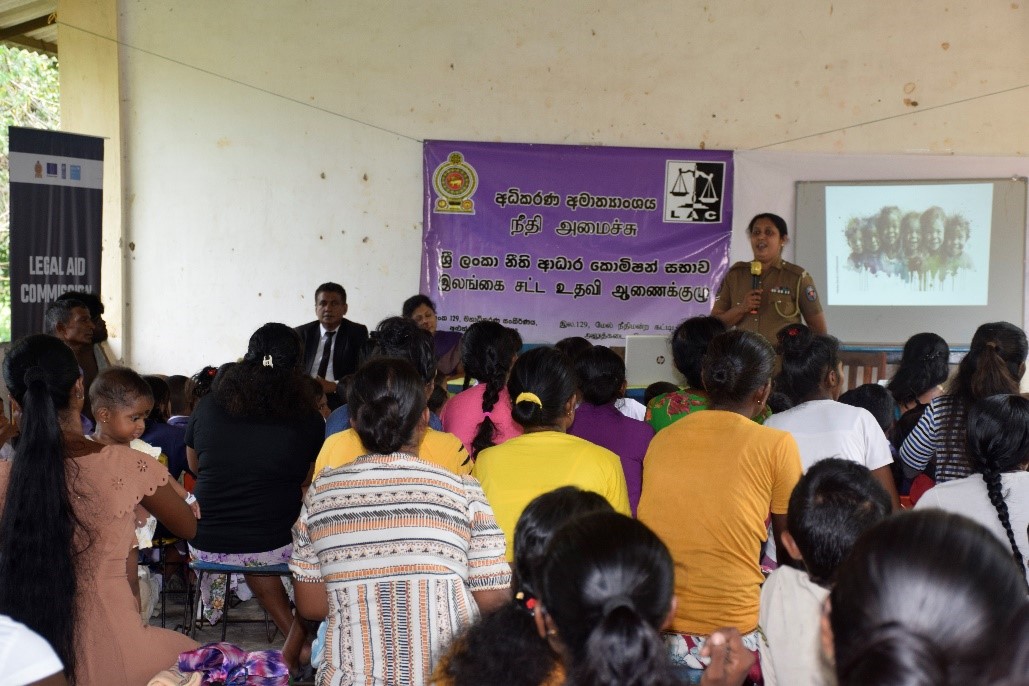Reviving Traditions in the Face of Modern Challenges Supported by the JURE Project
The Plight and Hope of Dalukaana's Indigenous Community
June 27, 2024

In the Polonnaruwa district lies Dalukaana, a rural village where an indigenous community resides amidst changing traditions and challenges. This community, though marginalized from other mainstream ethnic groups, struggles with evolving livelihood needs, legal constraints, and socio-economic hardships that shape their daily lives.
Preserving Traditions in a Changing Landscape
Historically, the indigenous people of Dalukaana sustained themselves through practices like hunting and wearing traditional garments woven from local resources. However, over time, environmental conservation laws have restricted their ability to continue these practices, pushing them towards alternative livelihoods such as fishing, gathering fruits, and harvesting honey from nearby forests. Yet, even these pursuits are not without challenges, as many lack access to land for cultivation, leaving them with uncertain income opportunities and a never-ending cycle of poverty.
Challenges Faced by the Community
Adding to these difficulties, gender disparities worsen their plight. Economic instability forces women to seek work in nearby spas, where they face exploitative conditions and sexual harassment. This vulnerability extends into their homes, where male family members, often struggling with unemployment and alcohol addiction, commit further harassment and intimate partner violence.
Moreover, educational opportunities have been limited for the children of Dalukaana, although efforts are underway to integrate them into the broader educational system. To overcome poverty, some parents resort to selling essential school provisions to make ends meet. This reality highlights the pressing need for community support and legal awareness to help the Indigenous community overcome various hardships, such as sexual harassment, family law issues, land disputes, and child abuse.

Addressing Legal Needs and Empowerment
Recognizing these multifaceted challenges, initiatives like the Legal Aid Clinic organized by the Legal Aid Commission, supported by the European Union-funded ‘Support to Justice Reform’ (JURE) project, implemented by the United Nations Development Programme (UNDP) and UNICEF Sri Lanka and facilitated by the Ministry of Justice, holds immense significance.
Recently held at Dalukaana Primary School, this clinic aimed to empower the indigenous community by providing crucial legal assistance. The initiative seeks to ensure equitable access to justice, safeguarding their rights. Furthermore, many participants actively engaged in the sessions by asking questions and seeking clarification on various legal matters that directly impact their daily lives. Several attendees requested personal guidance for specific legal issues they were facing.
A devoted community member and mother expressed her gratitude for the legal aid clinic, highlighting its impact on her community and personal experiences in Dalukaana noting,"The legal aid clinic today has been very helpful for us. Living in Dalukaana, a region full of challenges, we learned valuable lessons that can significantly improve our lives. I moved to Dalukaana five years ago after marrying my husband, and it felt like a completely different world compared to where I came from. Here, we don’t have our own land for cultivation, nor can we engage in our traditional food-finding practices like hunting. This has made poverty a major concern, complicating our lives and exposing us to various injustices. The legal aid clinic addressed many of our legal issues, and now we have the awareness to connect with relevant officials if we face similar challenges in the future."

The Role of JURE and Legal Aid
The Support to Justice Reform (JURE) project aims to enhance an independent judiciary and a responsive justice system in Sri Lanka.
Assistant/ Deputy Director - Administration, Mr. Rukman Gamage from the Legal Aid Commission, emphasized the importance of such initiatives, noting that "Dalukaana is a village full of potential. Our goal is to provide not just legal assistance, but also to foster a sense of hope and opportunity. We believe that by equipping individuals with the right tools, we can help them build a better future for themselves and their families."
Education on legal rights and responsibilities empowers community members to navigate legal complexities confidently. Through collective efforts and ongoing support, we can amplify their voices and champion justice for all, ensuring that no community is left behind in the pursuit of a more equitable society.
Resources
https://arts.pdn.ac.lk/afcp/adivasi.php
https://www.bbc.com/travel/article/20220327-sri-lankas-last-indigenous-people
https://amazinglanka.com/wp/dimbulagala-kosgaha-ulpotha/

 Locations
Locations